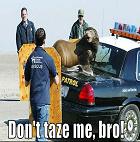jamo262
Posts: 82
Joined: 4/21/2003
From: Perth Australia
Status: offline

|
[Q] From Steve Gearhart: “Where does the term baited breath come from, as in: ‘I am waiting with baited breath for your answer’?”
[A] The correct spelling is actually bated breath but it’s so common these days to see it written as baited breath that there’s every chance it will soon become the usual form, to the disgust of conservative speakers and the confusion of dictionary writers. Examples in newspapers and magazines are legion; this one appeared in the Daily Mirror on 12 April 2003: “She hasn’t responded yet but Michael is waiting with baited breath”.
It’s easy to mock, but there’s a real problem here. Bated and baited sound the same and we no longer use bated (let alone the verb to bate), outside this one set phrase, which has become an idiom. Confusion is almost inevitable. Bated here is a contraction of abated through loss of the unstressed first vowel (a process called aphesis); it has the meaning “reduced, lessened, lowered in force”. So bated breath refers to a state in which you almost stop breathing through terror, awe, extreme anticipation, or anxiety.
Shakespeare is the first writer known to use it, in The Merchant of Venice: “Shall I bend low and, in a bondman’s key, / With bated breath and whisp’ring humbleness, / Say this ...”. Nearly three centuries later, Mark Twain employed it in Tom Sawyer: “Every eye fixed itself upon him; with parted lips and bated breath the audience hung upon his words, taking no note of time, rapt in the ghastly fascinations of the tale”.
For those who know the older spelling or who stop to consider the matter, baited breath evokes an incongruous image, which Geoffrey Taylor humorously (and consciously) captured in verse in his poem Cruel Clever Cat:
Sally, having swallowed cheese,
Directs down holes the scented breeze,
Enticing thus with baited breath
Nice mice to an untimely death.
[I’m indebted to Rainer Thonnes for telling me about this little ditty, which appears in an anthology called Catscript, edited by Marie Angel. However, it was first published in 1933 in a limited edition of Geoffrey Taylor’s poems entitled A Dash of Garlic.]
|
 Printable Version
Printable Version















 It will motivate me to try again and get some payback.
It will motivate me to try again and get some payback.

 OMG do not say months and jinx us
OMG do not say months and jinx us 
 New Messages
New Messages No New Messages
No New Messages Hot Topic w/ New Messages
Hot Topic w/ New Messages Hot Topic w/o New Messages
Hot Topic w/o New Messages Locked w/ New Messages
Locked w/ New Messages Locked w/o New Messages
Locked w/o New Messages Post New Thread
Post New Thread